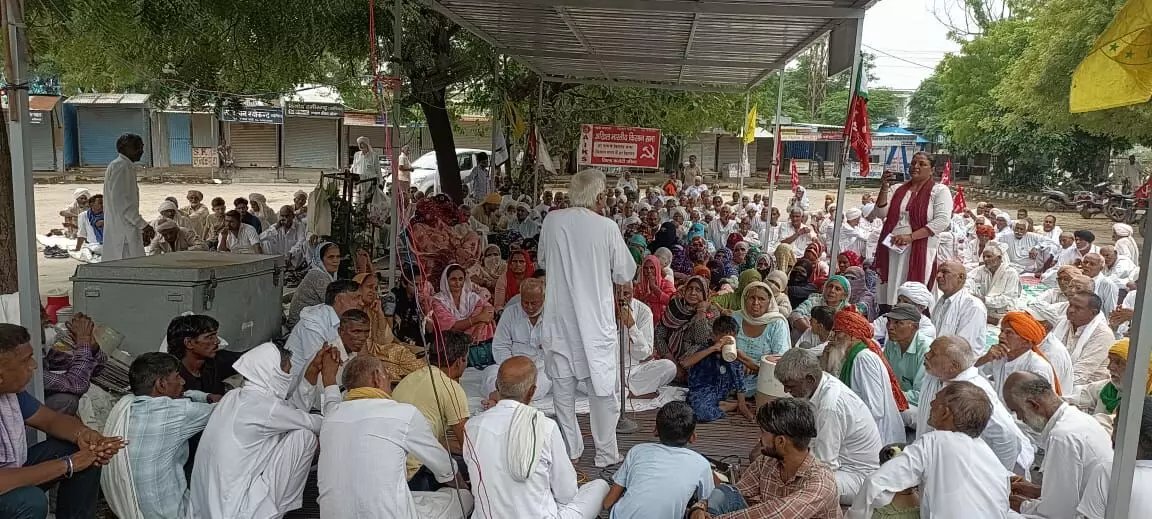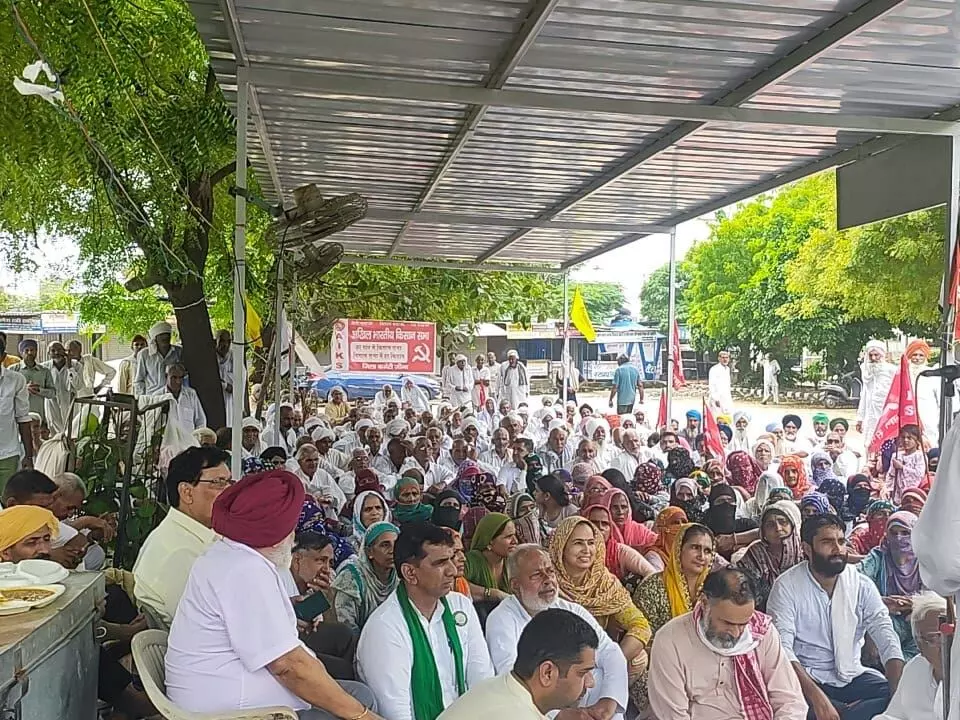Farmers Expand Base
Move into protest space again

Farmers are again moving into the protest space. With new dimensions being added to their earlier movement.
One is the larger programme being led by the Samyukta Kisan Morcha, which is the umbrella organization that had led the farmers' movement last year that saw the centre withdrawing the three controversial farm laws last year that were passed by the Parliament in 2020.
Second is the agitations taking place at the state and district levels that are being organized by various groups on local and regional issues.
The Agnipath scheme and the contentious Electricity (Amendment) Bill-2022 have added to the pent up anger on the minimum support price (MSP).
Farmers along with the trade unions of electricity department engineers and employees registered their opposition across Haryana, Punjab and various other places by burning copies of the electricity bill.
The SKM had stated earlier that the withdrawal of this Bill was one of the main demands of the year-long farmers' struggle. On December 9, 2021, the union government had given a letter to the SKM, which stated as follows, 'On the provisions in the Electricity Bill which affect farmers, there will first be a discussion with all stakeholders/SKM. Only after the discussion with the Morcha will the Bill be placed before the Parliament.'
The farmer leaders maintained that no such discussion has taken place in the last eight months. "This is therefore, a stark betrayal of the union government's own written assurances," the farmers conglomerate stated.
The SKM said the Bill aims to ensure entry of private companies in the power distribution sector. "This will give them enormous profits by hiking power rates for farmers, and for all other sections of the people in our country. Cross subsidy will be ended. Free or cheap electricity to farmers will end. The cost of production for farmers will further rise. Domestic rates of power in both rural and urban areas will rise tremendously. The jobs of electricity department employees and engineers will be adversely affected," the farmers statement read.
"It is a move of deceptive orientation with tools like direct benefit transfer (DBT). It is the creation of an illusion to trap people like they did in the case of LPG subsidy. There is a federal element involved as power is in the concurrent list and states cannot be ignored. The other two stakeholders besides the state governments are consumers and employees. The burning of the copies of the Bill was the first protest action on the issue," said Inderjeet, who is an All India Kisan Sabha leader from Haryana.
On the broader national level, the SKM has come out with a road map of protests and demonstrations on Agnipath and other pending issues.
The farmers along with ex-servicemen and youth have joined hands to start a sustained campaign against the 'disastrous' Agnipath scheme. The SKM along with United Front of Ex-Servicemen that has completed 2600 days of continuous struggle for One-Rank One-Pension and various youth organizations protesting against the Agnipath scheme in particular and unemployment in general have started a series of Jai Jawan Jai Kisan Sammelans at selected places that will go on till August 14.
The inaugural Sammelan was held at Narwana in Haryana on August 7 where it was demanded that the Agnipath scheme be immediately withdrawn. The leaders also called for filling of all pending vacancies in the armed forces, completion of already initiated recruitment process and immediate release and withdrawal of cases against the youth protesting against the scheme.
Those attending the event pledged to take this campaign to every village across the nation.
A Jai Jawan Jai Kisan Rally was also held at Kolkata that started from Ram Leela Park at Moulali and marched till Lenin Statue in Dharmatala. Similar sammelans were also held at Muzaffarnagar and Mathura in UP.
According to SKM leaders, "This campaign aims to educate the public about the disastrous consequences of the controversial Agnipath scheme and compel the central government, by using democratic, peaceful and constitutional means, to roll back the scheme. If the farm laws were dire, the Agnipath scheme is disastrous. With our kisans and jawans in distress, the very backbone of our nation is in the danger of breaking. Our silence cannot be the reason for the government to bulldoze and destroy the protectors and feeders of the nation. We have stopped them once, we can stop them again."
It is being demanded that the Agnipath scheme be rolled back instantly and all the notifications issued under it must be withdrawn. The time-tested method of regular, permanent recruitment must continue.
"The pending vacancies (about 1.25 lakhs) and the current year vacancies (about 60,000) should be filled immediately following the pre-existing method of regular and permanent recruitment. The recruitment process already initiated must be completed with age-relaxation of two years in lieu of non-recruitment for the last two years," said the SKM leaders and leaders of Ex-servicemen.
It is also sought that all cases against anti-Agnipath protestors must be withdrawn and the arrested youth must be released forthwith. The leadership organizing the Sammelans has underlined, "There should be no privatization in the defence sector; the government must accept its responsibility for national security and protection of the honour and morale of armed forces."
Earlier on July 31, the farmers had marked the martyrdom day of the famous revolutionary Udham Singh by organizing protest demonstrations and traffic blockades against the 'betrayal' of the government on the issue of MSP and other issues. Demonstrations were reported from Punjab, Haryana, Uttar Pradesh, Bihar, West Bengal, Odisha, Maharashtra, Andhra Pradesh, Telangana, Karnataka, Tamil Nadu, Gujarat and Tripura, among other states.
The farmers now plan to mark the 75th anniversary of Indian Independence by organizing a 75-hour protest in Lakhimpur Kheri on From August 18 to 20 where they will once again be seeking the sacking of Ajay Mishra Teni.

The farmers have been saying, "The union government has not fulfilled any of the promises made to the SKM in its letter dated December 9, 2021, on the basis of which the farm movement was suspended. The Government is still not ready to discuss the legal guarantee for MSP. Nor have the false cases registered against the farmers been withdrawn. Ajay Mishra Teni remains in the union council of ministers even today."
The other demands of the farmers include removal of the penal provisions on farmers in the 'Commission for Air Quality Management in the National Capital Region and Adjoining Areas Act 2021', withdrawal of 'false' cases registered against the farmers over the course of the movement, dismissal and arrest of Teni and compensation and rehabilitation to the families of the martyrs of the farm movement along with allocation of land to build a memorial in their memory at Singhu Morcha.
The issue of MSP along with ensuring a foolproof marketing system for alternative crops was taken up by the Punjab Chief Minister Bhagwant Mann at the national council meeting of Niti Aayog chaired by Prime Minister Narendra Modi on August 7.
Mann recalled that at the time when the country was starving for food, the hard working and resilient farmers of his state had made the country self-reliant in food production. He said that agriculture is no longer a profitable venture and the farmers are facing a serious crisis from which they need to be bailed out. Underscoring the need for making MSP on the crops a legal guarantee, he said the MSP must be remunerative as the input costs of agriculture have enhanced manifolds and farmers are not getting the right price of their harvest.
Coming back to the unrest in the rural domain, Kanwaljit Khanna who has been instrumental in organizing the farmers in Punjab said, "It is not the farmers but the government that is erecting one problem after the other. The farmers are left with no choice but to react to these issues that keep cropping up.
While the old problems remain unresolved there are new ones like the outbreak of lumpy skin disease among the cattle that crop up and for which the government is yet to do something to address the concerns of the farmers. The farmers now feel the need to jointly take up all the issues whether it is the Agnipath, the MSP, The Electricity (Amendment) Bill or Lakhimpur Kheri."
He further said, "The protests will gather pace and eventually convert into a larger movement. Even those leaders keeping aloof as of now will be compelled by their own cadres to join the movement once things get going. The people know that a daylong protest or a few hours of traffic blockade make no difference to the government. It reacts only when there is a long term agitation. The people are left with no option as it has gone back on promises."
He said the rural distress is clearly getting reflected in the protests dotting the rural landscape across the states.
Inderjeet explained that things cannot be looked at in isolation. "The peasantry sends maximum youth to the armed forces. Hence, Agnipath is closely linked to it. The job scenario is so dismal that a large number of youth has simply stopped looking for jobs and has given up hope. The disappointment and desperation among the youth has the potential to take them towards drugs which is no longer the menace in Punjab alone. This in turn leads to crime. Just look at the Sidhu Moosewala assassination case. Most of the accused were youth from Haryana," he maintained.
His point of view was further echoed by Sanjay Chauhan who is the co-convener of the Sanyukta Kisan Manch that is spearheading an agitation of fruit growers in Himachal Pradesh.
"The situation that is emerging is very dangerous. Agriculture is yielding below subsistence returns and the people are compelled to take up odd jobs under Mahatma Gandhi National Rural Employment Guarantee Act (MNREGA) or work in hotels or take to driving taxis etc. The increasing stress among horticulturists and those growing cash crops because of spiralling input costs and there being no market sustainability has made things worse further.
"Take for example the crisis of tomato farmers. The farmer is not getting more than Rs 5 per kg while the consumers continue to shell up to Rs 30 to Rs 40 for it. This is a dangerous phenomenon that has come up in cash crops."
He further explained that the Agnipath scheme has caused a lot of anger among the people. "All jobs have become casual and there is no industry in Himachal Pradesh to address the employment concerns of the youth. There is a major deep rooted crisis confronting the people of the state," he said.
Besides there are several local concerns for which farmers are agitating at various levels. There have been protests in places like Adampur and Khedi Chopta in Hisar and Narwana. These agitations were marked by farmers laying siege to government offices on issues of compensation for damaged crops. Sources say these protests have seen farmers camping for one and a half to almost three months.
Similarly, in Jalandhar in Punjab, organizations including the Punjab Khet Mazdoor Union, Pendu Mazdoor Union and Punjab Khet Mazdoor Sabha staged a dharna on Monday demanding that employment wages of landless labourers be fixed at Rs 700 per day even for MNREGA jobs. They also demanded that a third of Panchayat lands be given to Dalits. Their other demands include a complete loan waiver along with residential plots of land.
"Often caste conflicts have been used as a tool by those in power to destroy people's movements. Our effort is to counter such attempts through class unity by raising common issues of the entire peasantry along with those of agricultural and non agricultural labourers. Once this is achieved only then alternative policy narratives can be developed," Inderjeet told The Citizen.




